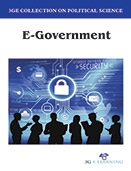Political Science

The 21st century is the era of Information Technology. It brings the rebellion transformations in the functioning of whole world. The current impact of technology has been realized on government sectors where government offices and services are administered through information technology. The adoption of new technology in government sector emerges new phenomenon called e-governance. The essence of e-government is to link government activities with the advanced technology that the world is having today. This technology has already shown a remarkable job in bringing efficiency in private sector through e-business, e-banking, e-procurement etc. E-governance refers to the application of ICT to the processes of government functioning for good governance. In other words, e-governance is the public sector’s use of ICTs with the aim to improve information and service delivery, encourage citizen participation in decision-making and make government more accountable, transparent and efficient. In other words, the information age has redefined the fundamentals and transformed the institutions and mechanisms of service delivery forever. The vision is the articulation of a desire to transform the way government functions and the way it relates to its constituents. The concept of electronic governance, popularly called e-governance, is derived from this concern. Democracies in the world share a vision of the day when e-governance will become a way of life. Effective e-government is becoming an important aim for many governments around the world.
Within this context this book aims to discuss the concepts of e-government such as: e-government definition, types, advantages and barriers to e-government. It provides essential background knowledge to the research subject, as well as highlighting the main concepts of e-government. Government makes best possible efforts to communicate and provide information to common man and businessman. Today’s government has full faith in E-Governance and widespread network of E-Governance across the world proves its importance. E-Government is the online delivery of local/national governmental information, services to the citizens, businesses and other governmental agencies. This book provides a comprehensive, integrative, and global assessment of the concerns associated with e-governance, including a synopsis of issues and experiences, and a comparison of e-governance efforts. It serves as valuable tool for students as well as policy-makers in government.